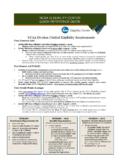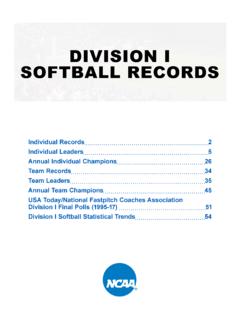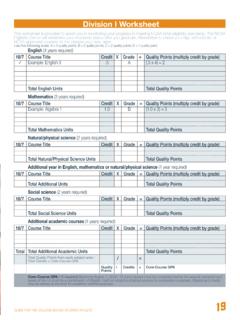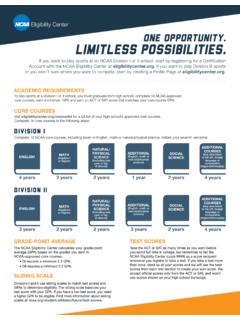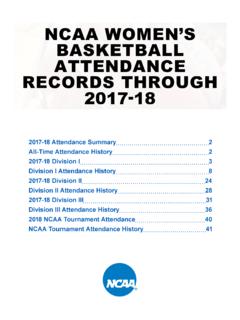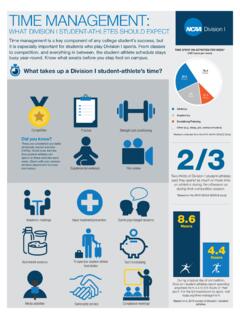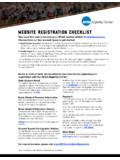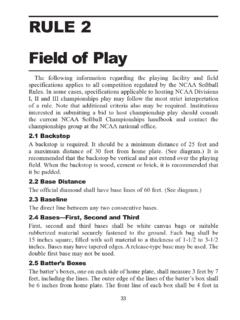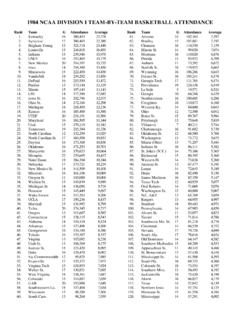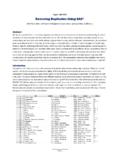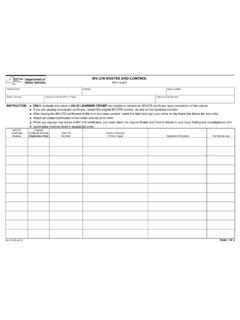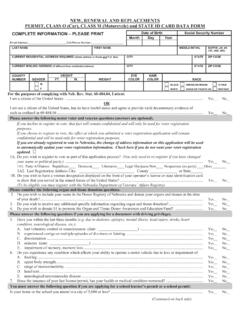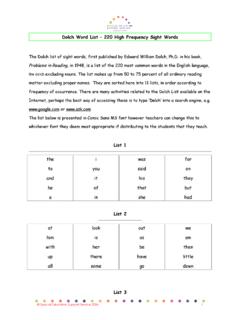Transcription of Academic Eligibility Frequently Asked Questions
1 Academic Eligibility Frequently Asked Questions When should a student register with the NCAA Eligibility Center? Students should register with the NCAA Eligibility Center at the beginning of their sophomore year in high school. At the end of the student's junior year, a transcript, including six semesters of grades, should be sent to the NCAA Eligibility Center from the high school. Additionally, students should have their SAT or ACT scores forwarded directly to the NCAA Eligibility Center (by using code "9999") whenever they take the exam. What is the fee to register? Beginning October 1, 2014, the registration fee is $75 for , Territories and Canadian students ( Territories include American Samoa, Guam, Northern Mariana Islands, Puerto Rico and Virgin Islands); and $130 for all other international students. Is this fee refundable?
2 All fees are nonrefundable after successful registration. No refunds will be given due to nonparticipation or disinterest at an NCAA Division I or II college or university. In the event a duplicate registration was completed and duplicate payment was processed, you may be eligible for a refund of the duplicate registration fee(s). A completed refund request form must be sent to the NCAA Eligibility Center for consideration. You can find the form by going to , clicking the link to enter for NCAA College-Bound Student- Athletes. You will then click Resources at the top of the page and then Forms.. What requirements do I need to be able to practice, play and get a scholarship at an NCAA. Division I or II college or university? You need to complete the following: 1. Graduate from high school;. 2. Complete a minimum of 16 core courses (Note: there will be new Academic requirements for students enrolling on or after August 1, 2016, for NCAA Division I).
3 3. Present the required grade-point average (GPA) (for complete details, see the Division I. Quick Reference Guide for the Division I GPA requirements; and currently, a minimum GPA for Division II, which will be changing in 2018);. 4. Present a qualifying test score on either the ACT or SAT (for complete details, see the Initial Eligibility Quick Reference Guide); and 5. Request final amateurism certification (beginning April 1 for fall enrollees or beginning October 1 for spring enrollees). Academic Eligibility Frequently Asked Questions Page No. 2. _____. How do I know if the courses I am taking will count as core courses? You need to look at your high school's List of NCAA Courses. Follow these steps: 1. Go to the NCAA Eligibility Center website at ;. 2. Click on the "NCAA College-Bound Student-Athletes" link to enter.
4 3. Click on "Resources";. 4. Click on " Students";. 5. Click on List of NCAA Courses ;. 6. Input your high school's six-digit code (if you know it) or search by your high school's name and state; and 7. Review the list. *Very important: If a core course you took is not on the list, it will not be used in your Eligibility determination. Courses that appear on your transcript must exactly match what is on the list. What do I do if a core course I took is not on the list? See your high school counselor immediately. Someone at your high school is responsible for keeping your high school's list updated. It is important your high school does this each year to make sure the core courses you are taking appear on the list. What is the lowest grade that will be used for a course to count as a core course? Follow your high school's policy regarding its lowest passing grade.
5 If the NCAA Eligibility Center does not have this policy, the lowest passing grade that will be used is D. Will credit-by-exam courses meet core-course requirements? No. Courses completed through credit-by-exam will not be used. Are vocational courses acceptable? No. Traditional vocational courses ( , typing, auto mechanics, driver's education and health). are not acceptable. Do pass/fail grades count? Maybe, these grades may satisfy your core-course requirements. The NCAA Eligibility Center will assign your high school's lowest passing grade for a pass/fail class so long as the course receives credit toward graduation. May courses taken in the eighth grade that are high school core courses ( , Algebra I, Spanish 1, Freshman Composition) be used to meet the core-course requirement? A high school course taken in the eighth grade may be used if the course is on the high school transcript with a grade and credit and if the course is on the high school's List of NCAA Courses.
6 Academic Eligibility Frequently Asked Questions Page No. 3. _____. May independent-study, Internet and correspondence courses count as core courses? Yes, if the following conditions are met: 1. Courses that are taught through distance learning, online, credit recovery, etc. need to be comparable in length, content and rigor to courses taught in a traditional classroom setting. Students may not skip lessons or test out of modules. The course must be four- year college preparatory. 2. All courses must include ongoing access between the instructor and student, as well as regular interaction for purposes of teaching, evaluating and providing assistance. This may include, for example, exchanging of e-mails between the student and teacher, feedback on assignments, and the opportunity for the teacher to engage the student in individual instruction.
7 Any course taken must have a defined time period for completion. For example, it should be clear whether the course is meant to be taken for an entire semester or during a more condensed time frame, such as six weeks, etc. 3. Nontraditional courses should be clearly identified as such on the high school transcript. Nontraditional courses completed prior to August 1, 2010, will be reviewed under NCAA. standards in place prior to August 1, 2010. It is important to remember that all courses need to be rigorous and four-year college preparatory in nature. Students should be encouraged to take courses that are quantitatively and qualitatively the same as courses offered through traditional means, and to take courses that will prepare them for the Academic rigors they will face at a four-year college or university. To read more about this new rule, go to and click the "High School Administrators Enter Here" link, then the "Resources" page and read the documents related to online/virtual/credit recovery courses.
8 May college courses count as core courses? College courses may be used to satisfy core-curriculum requirements if the courses are accepted and awarded credit by the high school for any student and meet all other requirements for core courses. For NCAA Division I only, such courses must be placed on the student's high school transcript. Courses taken at a college will NOT appear on the high school's list of NCAA. courses. The high school's List of NCAA Courses will include only those courses taught/offered by the high school. How are courses taken over two years counted? A one-year course that is spread over a longer period of time is considered one course and will receive a maximum of one core-course credit. (Example: Algebra 1, spread over two years, would receive one unit of credit.). Academic Eligibility Frequently Asked Questions Page No.
9 4. _____. May my study in a foreign country help me meet core-course requirements? If you attended a secondary school outside the United States for all or part of grades nine through 12, different evaluation procedures will be applied to your international education documents. You must submit original-language documents with certified translations for NCAA Eligibility Center evaluation. How is my core-course GPA calculated? Your core-course GPA is the average of your best grades achieved for all required core courses. If you have taken extra core courses, those courses will be used in your GPA, only if they improve your GPA. Can weighted grades for honors or advanced-placement courses be factored into the calculation of the student's core GPA? A school's normal practice of weighting honors or advanced courses may be used, as long as the weighting is used for computing GPAs.
10 Weighting cannot be used if the high school weights grades for the purpose of determining class rank. Additionally, in no instance may the student receive greater than additional quality point for purposes of calculating the GPA for initial Eligibility . How is the NCAA core GPA different from a student's overall GPA? The NCAA core-course GPA is calculated using only NCAA-approved core courses in the required number of core units. High school GPAs generally include the grades from most or all courses attempted in grades nine through 12. Academic Eligibility Frequently Asked Questions Page No. 5. _____. Will courses taken after my senior year meet core-course requirements? For Division I, maybe. Only courses completed in grades nine through 12 will qualify as core courses for Division I. If you graduate from high school on time (in eight semesters) with your incoming ninth grade class, you may use one core course completed in the year after graduation (summer or Academic year) prior to full-time collegiate enrollment.
